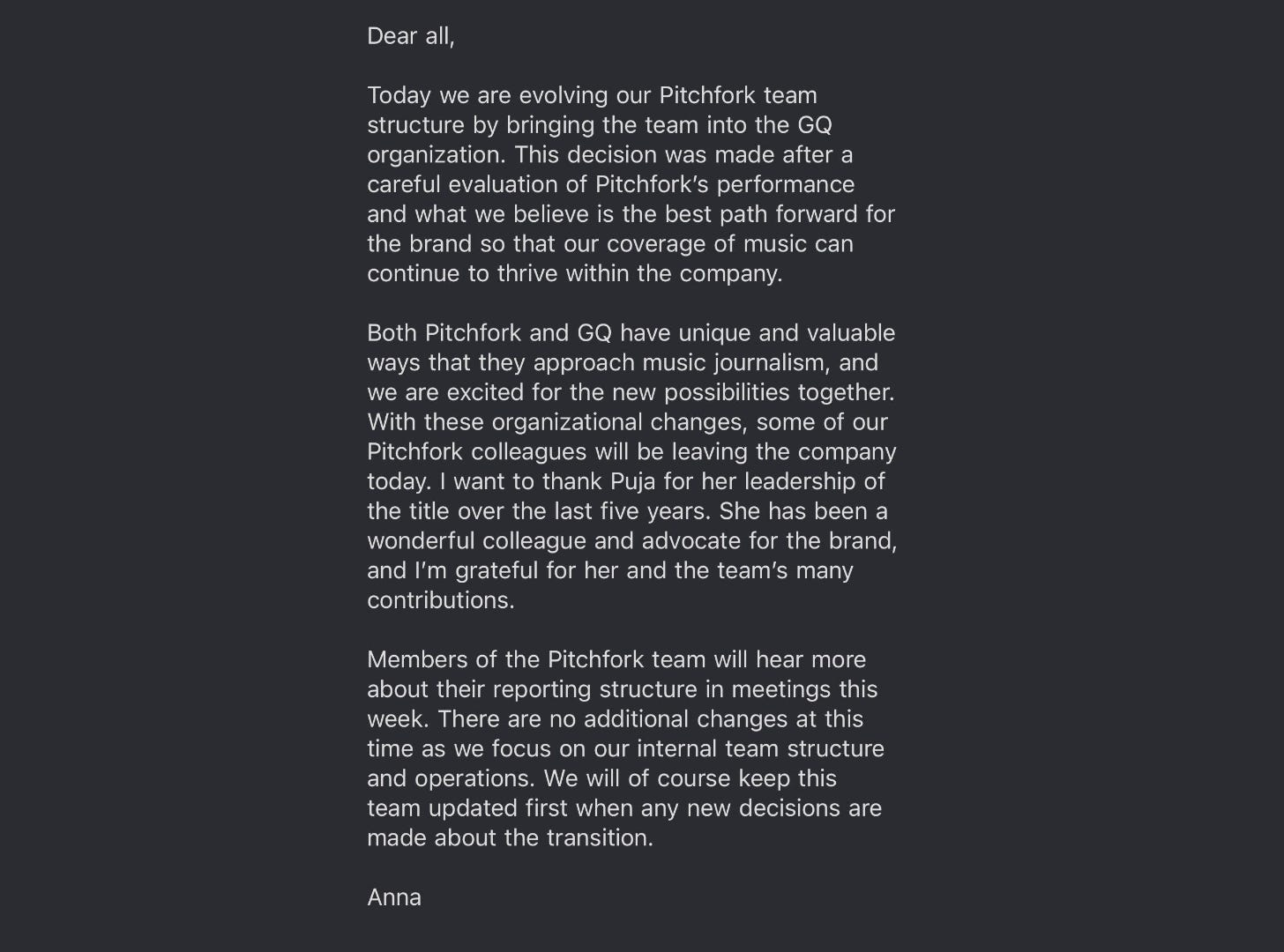RIP Pitchfork
Music journalism continues to writhe and choke
I had a different version of The Rectangle all ready to send you today, but when I saw the news I knew I had to write about it.
Pitchfork is dead.
A leaked announcement revealed the music website’s owner, Condé Nast, is moving it under GQ.
It’s the end of an era — and an event that symbolises the state of music journalism in 2024.
More than that, though, it’s real fucking sad.
It’s hard to quantify the impact Pitchfork had on my life.
I started reading the website in the early 2000s (it launched back in 1996). It not only introduced me to countless amounts of excellent music, but also was my first exposure to “serious” music journalism.
Pitchfork wrote about bands and artists as though they were the most important thing in the world — which, to me, they were.
It wasn’t perfect. Far from it. The outlet could be genuinely nasty. I mean, Pitchfork destroyed careers, something that, nowadays, comes across as bitter and petty.
At the time though? I loved it.
The site’s ethos was that art matters and it’s worth taking seriously. If perfection exists, then so does its opposite.

Nothing stays the same though. Pitchfork’s shift happened gradually, but accelerated when it was bought by Condé Nast in 2015.
Around this time I stopped visiting as regularly. The coverage got poppier and the reviews more moderate. It morphed into something less esoteric, broader, and softer.
This isn’t a criticism per se, it had to. Times changed. Pitchfork was no longer an outsider sticking its middle fingers up at the industry, but the industry itself.
And you know what? Despite my minor gripes with its mainstream shift, I still read Pitchfork. It was a bastion of top-quality music journalism, somewhere that posted thoughtful and in-depth articles.
The emphasis there is on “was.”
Condé Nast folding Pitchfork under GQ — a brand it has nothing to do with — and firing half the outlet’s staff is about one thing and one thing only: making money.
The publisher wants to cut as many costs as possible and squeeze whatever revenue it can out of Pitchfork’s withering corpse, quality be damned.
I don’t know the financial state of the music publication. It was profitable in the recent past and has a thriving events arm. My guess though is it simply wasn’t making enough money.
Whatever the truth is, one thing’s inarguable: this is a terrible day for music journalism.
From NME going digital only to Q’s closure, the disappearance of music publications is the loss of something special.
Whether you like specific outlets’ coverage or not is inconsequential. They’re about more than that.
Publications make artists seem important, they boost the industry, and give people a common reference point — even if that’s just something to disagree with.
More than that though, they’re human.
As with so many other things, algorithms have taken hold of music. Whether it’s YouTube spewing out suggestions, TikTok posts being promoted, or Spotify’s AI-driven recommendation playlists, these systems are rigid and logic based.
I’m not saying that you can’t find excellent music this way — I’ve discovered amazing artists on all those services — more that this way of engaging with music cheapens it.
There’s no thought, little consideration. It’s a computer flashing pre-ordained slot machine icons at you until it comes up with a combination you like.
What makes music outlets so good is they’re communities, a collection of people egging each other on to find something new, to build something, to treat art with reverence, to discuss like it’s important.
Because it is. Music matters. It’s not a commodity. It’s art. It’s meaningful. It’s important.
And Pitchfork knew.
Seeing it go sucks. I miss it already.
Sadly, things are bigger and more depressing than that alone. Pitchfork’s demise shows professional music journalism is slipping away.
We’ll all be sorry when it’s gone.




